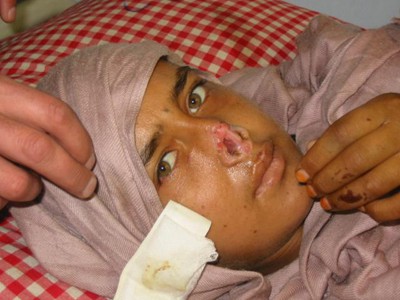By Jamieson Lesko
KABUL – Women’s rights in Afghanistan have regressed in the past year, increasing worry about what the future holds, according to a Human Rights Watch report released Thursday.
As the country faces a large-scale troop withdrawal by the end of 2014, the organization expressed concern that, “with international interest in Afghanistan rapidly waning, opponents of women’s rights seized the opportunity to begin rolling back the progress made since the end of Taliban rule.”
The comprehensive global report outlines actions it says Afghan President Hamid Karzai’s government has taken to specifically undermine rights for women and girls.
Among those actions was a parliamentary attempt to appeal the groundbreaking law on the “Elimination of Violence Against Women,” which was passed by presidential decree in 2009.

Nazia, 16, was wedded to a 40-year-old man who brutally cut off her ears and nose, shaved her head and burnt her feet with boiling water. The Ministry of Justice — with parliamentary approval — revised the criminal code, adding a provision that bans family member testimony in criminal cases. This, the report argues, “makes it extremely difficult to prosecute domestic violence and child and forced marriage.”
Although the law remains valid, its enforcement is weak, the report states. A brief debate on the law “heralded, and perhaps triggered, subsequent attacks and setbacks within the government during the year,” said the Human Rights Watch report.
Another setback was the reduction of parliamentary seats reserved for women from 25 percent to 20 percent, triggering concern that female representation may even wane further in years to come.
Also, the Ministry of Justice — with parliamentary approval — revised the criminal code, adding a provision that bans family member testimony in criminal cases. This, the report argues, “makes it extremely difficult to prosecute domestic violence and child and forced marriage.”
During 2013 there was also an uptick in violence against high-profile women in positions of authority. Targeted assassinations included the shooting of a member of parliament, Roh Gul, as she was traveling through Ghazni province with her family in August. She survived the attack but her 8-year-old daughter and driver were killed.
Meanwhile, world-renowned author Sushmita Banerjee was also found murdered in September. Her dramatic memoirs about marrying an Afghan man and escaping the Taliban were turned into a Bollywood movie, “Escape From the Taliban,” before she moved back to Afghanistan.
And the highest ranking police officer in Helmand Province, Lt. Nigar, who was known by just one name, was killed just months after her predecessor’s assassination.
Beyond attacks on women’s rights, the report outlines other general examples of “declining respect for human rights” across the country.
“Impunity for abuses was the norm for government security forces and other armed groups,” it states, which raises concerns about the “fairness of the upcoming presidential election.”



